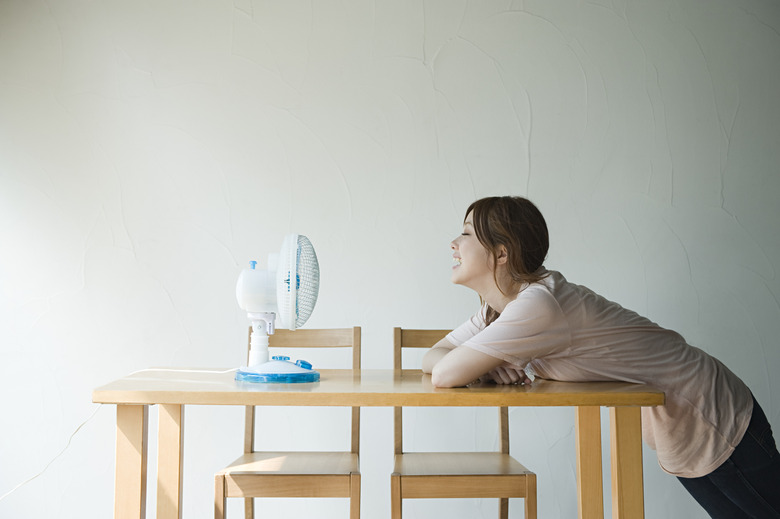Your Body On: A Heat Wave
Feel like you're hearing "it's a hot one!" every day?
It's not just you: In most of the country, this summer has been sweltering. Take the record-breaking heat wave in Southern California that reached 117 degrees F, or the 105F temperature recorded in Denver. It's also a global phenomenon. Earlier this month, heat records were set all over the world, including in Quebec, where 70 people died as a result.
Clearly, summer heat waves do more than make you long for the AC – they also have a serious effect on your body. But how can a heat wave really affect your health? Read on to find out.
The Basics of Temperature Regulation
The Basics of Temperature Regulation
Your body works best at a core temperature of between 97.7 and 99.5 degrees F, and it works hard to stay within that range – a process called thermoregulation.
When it's cold, your body restricts blood flow to your skin to reduce heat loss, and may even trigger muscle contractions via shivering to help generate heat. When it's hot, your body dilates your blood vessels to increase circulation to your skin.
You also start sweating. As the sweat evaporates, it absorbs energy in the form of heat, which has a cooling effect for you. This evaporative cooling is part of why fans feel cool – they speed up the evaporative process – and why a warm breeze can feel frigid when you've just stepped out of the pool.
How Does Humidity Fit In?
How Does Humidity Fit In?
Unless you live in a dry climate, the humidex or AccuWeather RealFeel® (which incorporates multiple factors to determine how hot it feels outside) figures will often soar much higher than the actual temperature during a heat wave. Humid air feels hotter than dry air because of how humidity affects sweat evaporation.
Air can only hold so much evaporated water at a time, similar to how a solution can only hold a certain amount of solute before it becomes saturated. The air's measure of saturation is called relative humidity. At a low relative humidity – say, the 10 percent relative humidity you might experience in Las Vegas – your sweat can evaporate easily, and body's cooling systems work efficiently.
Head to a region with high relative humidity – like the the 65 percent or higher humidity you might find in a heat wave in New York City – and your sweat can't evaporate as well and you'll continue to feel too warm. At a certain point, with extremely high temperatures and humidity, it would become impossible to cool off by sweating at all.
What Happens When You Overheat?
What Happens When You Overheat?
Your body works hard to keep your core temperature down, but if the heat and humidity are just too much to bear, it can cause problems. Your cells' enzymes don't work as well with the heat is too high. In extreme cases, your cells aren't able to function properly, which can be life-threatening.
Well before that, though, you'd start to feel sluggish, develop a headache or muscle cramps – all signs of heat exhaustion, according to the CDC. If you develop these symptoms, take steps to help your body's evaporative cooling system out. Chill out in front of a fan, put on moisture-wicking clothes dampened with cold water for even more evaporative cooling, and sip water to replace the fluids lost via sweat.
Left alone, the heat exhaustion can turn more serious. Someone with severe heat exhaustion or heat stroke might feel confused, start throwing up, feel their heart race or even start losing consciousness. If that happens, call 911.
If you're getting nervous, fear not: If you stay hydrated and avoid too much activity in the hottest hours of the day, your chances of developing heat stroke are slim. But check up on friends and family members most at risk – like older adults, people with heart conditions, or those with more body fat or muscle – to help them stay safe.
As for how to spend your time when it's sweltering? We recommend spending some quality time in front of the fan working through your summer reading list, so you're free to head outside when the heat wave is over.
Cite This Article
MLA
Tremblay, Sylvie. "Your Body On: A Heat Wave" sciencing.com, https://www.sciencing.com/your-body-on-a-heat-wave-13714002/. 23 July 2018.
APA
Tremblay, Sylvie. (2018, July 23). Your Body On: A Heat Wave. sciencing.com. Retrieved from https://www.sciencing.com/your-body-on-a-heat-wave-13714002/
Chicago
Tremblay, Sylvie. Your Body On: A Heat Wave last modified March 24, 2022. https://www.sciencing.com/your-body-on-a-heat-wave-13714002/
